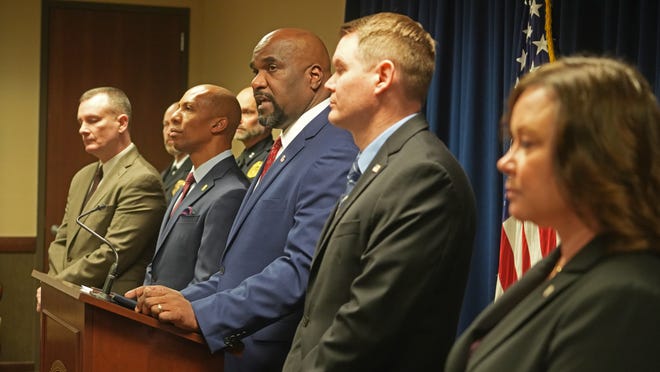

An international drug kingpin given the same designation as the infamous “El Chapo” admitted in federal court Friday morning in Columbus his alleged crimes and agreed to surrender the most cryptocurrency ever seized by U.S. law enforcement.
Banmeet Singh, 40, will forfeit as part of a plea agreement accounts valued at more than $327 million as of 1 p.m. Thursday. The price of cryptocurrencies fluctuates frequently throughout each day.
Kenneth Parker, the U.S. Attorney for the Southern District of Ohio, said Friday the cryptocurrency was valued at $150 million when it was seized, believed to be the largest cryptocurrency financial seizure in DEA history.
The U.S. Attorney General designated Singh a priority target for the Organized Crime Drug Enforcement Task Force in 2019. The DEA had also designated Singh as a consolidated priority organization target, or CPOT, which Special Agent in Charge Orville Greene said is the designation for “leaders of the most prolific drug laundering that have the most impact on drug trafficking.” The CPOT title has been given to other notorious drug traffickers like Joaquin “El Chapo” Guzman.
Singh, an Indian national living in the United Kingdom until his 2019 arrest, also agreed to a jointly recommended eight-year prison term when he appeared before U.S. District Court Judge Algenon Marbley on Friday morning. He will formally be sentenced at a later date.
Parker said Singh began his drug operation on the traditional Internet before transitioning to the dark web.
“He would change up when he believed anyone would be onto the operation,” Parker said, using codenames like “Liston” and “Liston is here.”
“He would even sign off in a self-perceived cutesy manner ‘I’m still dancing,'” Parker said. “He has not danced in quite some time.”
Singh admitted in court Friday to running an international drug ring from his UK home that distributed heroin, cocaine, fentanyl, ecstasy, LSD, ketamine, Xanax and other drugs to at least eight places in the United States, including Columbus. The ring operated from at least 2012 through 2017.
Singh has at least seven co-conspirators, Parker said, including two who have been convicted in the Southern District of Ohio. Others are facing charges in New York, North Carolina, North Dakota and Maryland.
U.S. District Court records show Singh and his attorneys signed the plea agreement on Jan. 5, and it was unsealed Thursday ahead of Friday morning’s hearing. As part of the plea, Singh pleaded guilty to one count each of conspiracy to commit money laundering and conspiracy to distribute and possess with the intent to distribute controlled substances.
Federal prosecutors and Singh’s attorneys agreed to a jointly recommended sentence of 96 months, or eight years, in federal prison.
Parker said it was unable to be determined in the investigation whether the drugs Singh sent to Columbus, where he had at least two co-conspirators who would resell the drugs locally, led to any fatal overdoses. Had it been able to be proven, it would have required Singh to spend at least 20 years in federal prison, Parker said.
Singh also admitted to using the dark web and cryptocurrency to organize and run an international drug trafficking operation with cells in Columbus, Maryland, New York, Florida, North Dakota and other places in the United States.
According to the indictment, the drug trafficking rings sold heroin, cocaine, fentanyl, LSD, Ketamine, MDMA, Xanax and other narcotics. Customers would send cryptocurrency, usually bitcoin, to Singh from dark web accounts to vendor accounts set up by Singh, the indictment said.
Singh would then ship or arrange shipment of the drugs from Europe to the United States to a group of “reshippers” who would receive the drugs through the mail, repackage the drugs and send them to locations specified by Singh, including Jamaica, Canada, the U.S. Virgin Islands, Scotland, England and Ireland, according to court records.
“It’s a myth that drugs coming from international waters have to touch somewhere on the borderline,” Parker said. “When you impact the Southern District of Ohio, we’re going to go where we need to.”
In 2017, before his indictment, Drug Enforcement Administration officials had seized 59 kilograms of ecstasy, sometimes known as MDMA or Molly, and 19 kilograms of ketamine from what is believed to be a distribution cell of Singh’s.
Singh was indicted in 2018 on charges of conspiracy to distribute controlled substances, conspiracy to import controlled substances and money laundering conspiracy.
Singh did not arrive in the United States until March 2023 because of his multi-year effort to fight his extradition to the Columbus area, which he eventually withdrew in early 2023.
@bethany_bruner






